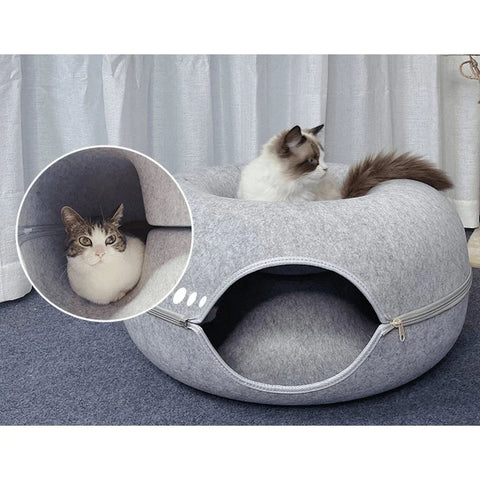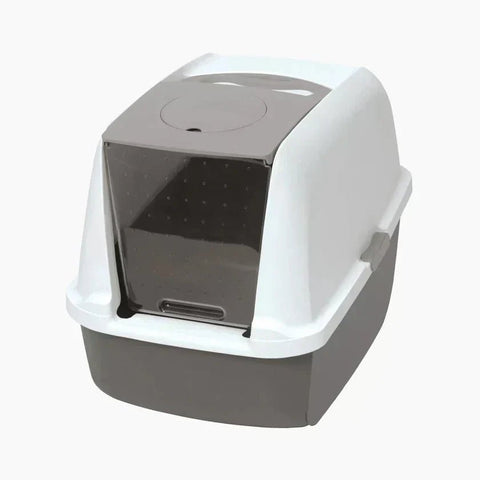🕒 How Many Hours Does a Cat Sleep Each Day?
On average, cats sleep between 12 to 18 hours daily. However, this can vary based on factors such as age, health, breed, personality, and environment. Here's a breakdown by age:
🐾 Kittens (Up to 2 Years)
Kittens can sleep up to 20 hours a day. Their bodies and brains are developing rapidly, and sleep supports this growth, bolstering their immune systems and overall health.
🐈 Adult Cats (2–10 Years)
Adult cats typically sleep between 12 to 16 hours daily. Indoor cats may sleep more due to less stimulation, while outdoor cats might be more alert and rest less frequently.
🐱 Senior Cats (10+ Years)
Senior cats often rest for 16 to 20 hours a day. Aging slows them down, and they may sleep more due to joint pain, reduced mobility, or underlying health conditions.

😴 Why Do Cats Sleep So Much?
Cats aren't lazy; they're efficient. Their sleep patterns are a mix of instinct and survival. Here's why they snooze so often:
- Crepuscular Nature: Cats are most active at dawn and dusk. The rest of the time is reserved for rest.
- Energy Conservation: In the wild, cats need short bursts of intense energy for hunting. Even domesticated cats retain this instinct, conserving energy through sleep.
- Boredom: A lack of stimulation can lead cats to sleep more. Providing toys and interactive play can help.
- Stress or Anxiety: Changes in the environment, like moving or new pets, can cause cats to sleep more as a coping mechanism.
- Health Issues: Illness or discomfort can lead to increased sleep. Monitor for changes in eating, grooming, or bathroom habits.
- Weather Changes: Cats may sleep more on cold or rainy days, seeking warmth and comfort.

🛌 Cat Sleeping Cycle
Cats follow a polyphasic sleep pattern, meaning they nap multiple times throughout the day. Each nap averages around 78 minutes but can range from 50 to 113 minutes. Unlike humans, who typically have one long sleep period, cats are crepuscular, being most active at dawn and dusk. This pattern aligns with their natural hunting instincts.
🛏️ Where Should My Cat Sleep?
Cats will nap wherever they please, from sunny windowsills to cardboard boxes. However, providing a designated, comfortable sleeping area can enhance their rest. Pets Villa offers a variety of cat beds to suit every feline's preference. For example, cat bed from Petsvilla with variety products.
⚠️ Is My Cat Sleeping Too Much? Should I Be Concerned?
While cats do sleep a lot, sudden changes in their sleep patterns can indicate issues. Be alert for:
- Sudden Increase in Sleep: Could signal illness, pain, or depression.
- Lethargy: Low energy and disinterest in normal activities.
- Changes in Eating or Drinking Habits: Sleeping more and eating less can be a red flag.
- Weight Loss or Gain: Sudden changes in weight alongside extra sleep can signal a problem.
If you notice any of these signs, consult your veterinarian.

🌟 Tips to Ensure Quality Sleep for Your Cat
- Provide a Comfortable Sleeping Area: Set up a quiet, cozy spot away from loud noises and foot traffic.
- Maintain a Routine: Feed and play with your cat at regular times to help them develop healthy sleep habits.
- Interactive Play: Engage your cat during their active hours, especially at dawn and dusk, to help them wind down more easily afterward.
- Regular Vet Check-Ups: Routine visits can catch health concerns early and keep your cat feeling and sleeping great.

❓ Frequently Asked Questions (FAQ)
Is it normal for cats to sleep all day?
Yes, cats average 12–18 hours of sleep daily. Some even go beyond 20 hours, especially kittens and seniors. If your cat is otherwise alert, eating, and playing when awake, there's no need to worry.
Do cats sleep for 70% of their lives?
Yes, cats can sleep for around 70% of their lives, or even more. That's roughly 16 hours a day. It's part of their natural sleeping rhythm and helps conserve energy for hunting (or, in modern life, play).
Is my cat happy if he sleeps a lot?
Often, yes. A well-fed, stress-free cat will sleep a lot. But if the sleep is paired with withdrawn behavior, poor appetite, or changes in litter habits, it could mean something's wrong.
How can I tell if my cat's sleep is healthy?
Healthy sleep is consistent and undisturbed. Your cat should wake up alert, stretch, groom, or ask for food. Watch for unusual signs, such as excessive sleeping, difficulty waking, or a lack of interest in play.
Can I change my cat's sleep schedule?
Not completely, but you can influence it. Cats are crepuscular and naturally active at dawn and dusk. By engaging them with play during the day and feeding them on a set schedule, you can shift their sleep habits slightly to better align with your routine.
Do cats sleep more as they age?
Yes, senior cats often sleep more, sometimes up to 20 hours a day. Aging slows their metabolism and energy, making rest more important.
How long can a cat go without sleeping?
Not long. Cats need frequent rest to stay healthy. While they might skip a nap if stressed or overstimulated, sleep deprivation can affect their mood, appetite, and immune system within just a day.
How long is a day for a cat?
A cat's day is still 24 hours like ours, but they experience it in shorter, scattered segments. While humans are usually active for about 16 hours and sleep for 8, cats flip the script, sleeping 12 to 18 hours, often in naps lasting 1 to 2 hours at a time. They are most active in the early mornings and early evenings, thanks to their crepuscular nature.
Remember, providing a comfortable and safe environment is key to your cat's health and happiness. For a variety of cozy cat beds and accessories, visit Pets Villa.







